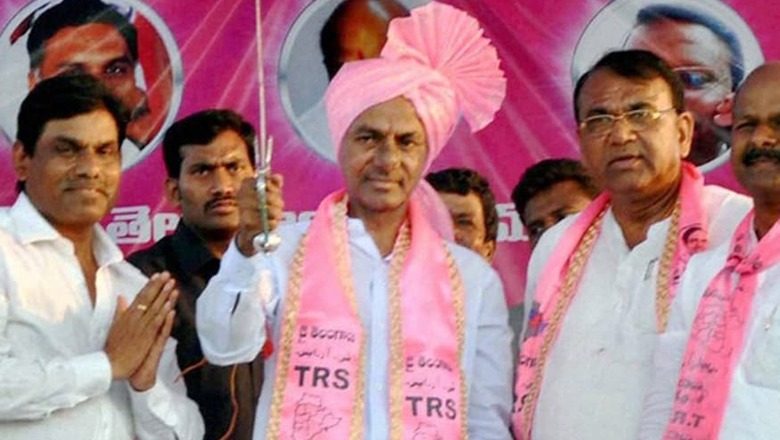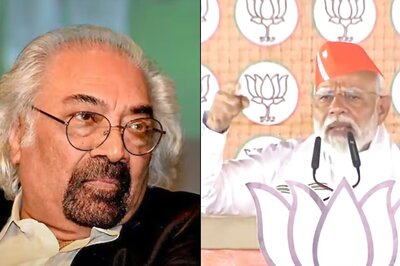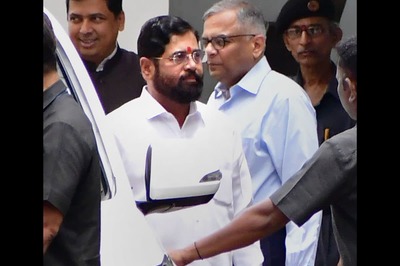
views
Hyderabad: At present, daily wage earners and producers of perishable articles and petty traders are adversely effected. They are required to line up in long queues to exchange money for conducting their daily business. Therefore the livelihood of workers working with them is also affected.
It is therefore necessary that the hardship to these sections is minimised and steps be taken to address them at the earliest.
- Mitigating Adverse Impact on Construction Sector: The sector worst hit following demonetisation is the real estate and construction sector which is a very vibrant source of employment for both skilled, semi-skilled and unskilled workers. Most of the workers engaged in this sector are daily wage labourers. In and around Hyderabad alone, it is estimated that nearly 10 lakh construction workers are engaged in this sector. They are left without work for the last more than a week. So is the case of workers engaged in the informal sector. It is of utmost importance that immediate steps are taken to give them productive work. A 'Special Fund' may be created by the Centre and States to take up works like house building, road repairs, road construction and development of other infrastructure facilities, where these labourers can be productively employed.
- Supporting Farmers: Most of the farmers and tenants do not operate their bank accounts. They are habituated to do most of their dealings in cash, they also keep cash at home. Due to wedding season, some of the farmers have sold their land in recent times and have received cash payments. Keeping in view these considerations, farmers may be allowed to deposit an appropriate amount and nominal taxes only be imposed on such deposits.
- Supporting Small Businesses: The informal sector (petty vendors/ small businesses of vegetables, fruit, poultry, meat, fish etc.) in India is a large part of the economy. This sector operates mostly on cash basis with minimum resort to banking transactions. This sector also needs to be provided with a facility of deposit of appropriate amount with nominal tax, as a onetime measure.
- MSME Sector - Allow upto 6 months to repay loan instalment before they are declared NPA.
- Supporting Poultry Industry: Telangana has the largest poultry industry in India. Eggs and chicken are perishable. Most of the chicken and egg business is cash based. Post demonetization, the business has dropped by 70%. Moratorium of bank loans for two years may be examined by the GOI in consultation with poultry industry associations.
- Increasing Cash Withdrawals in Special Cases: Immediately, the withdrawal limits for small businesses may be raised to Rs one lakh and for marriages to Rs 4 lakhs. The private hospitals should also be authorized to accept old notes. The deadline of accepting old notes for Government payments, petrol pumps etc. may be extended beyond November 24.
- Supporting States for Revenue Shortfall: The States are witnessing steady fall in revenue collections following demonetization. The revenue collection in Telangana (VAT, Motor Vehicle tax, Registration) in the last one week is lower by 50 percent as compared with the corresponding week of last month.
a) If these trends continue, the State is likely to face revenue loss of over Rs7500 Crores in the remaining period of current Financial Year. Such revenue reduction is not specific to Telangana but a common issue being faced by most of the States. This will result in failure of State Governments in meeting their commitments for the welfare of the people. It is therefore necessary that a mechanism may be developed to compensate these States for the loss of revenue following the demonetisation.
- Moratorium on Central Government Loans: A moratorium of one year may be given on payment of Principal and Interest on State Governments’ loans outstanding to Government of India.
- Moratorium of Principal on Open Market Loans: Likewise, a moratorium of one year may be given on the Principal payable by State Governments on loans outstanding to other Financial Institutions.
- Debt Swap and Increase FRBM Limit: Because of falling interest rates, States may be permitted to swap high cost debt with low cost debt with the help of a “Revolving fund” to be set up by Government of India. Further FRBM limit of borrowing upto 3-3.5 percent of GSDP per annum may be enhanced by 0.5-1 percent of GSDP as outflow of the states will decrease because of falling interest rates.
- Release of CST and Other Dues: As an immediate measure to overcome the cash crunch of state governments, the dues accruable to the States like CST compensation may be cleared during the current Financial Year itself.
- Measures to strengthen Banking infrastructure:
Server Capacity of Banks to be increased, as the traffic is likely to increase to several folds once e-transactions increase.
All types of Debit and Rupay cards to be made available expeditiously.
Aadhar Card Data, with Unique Bank Account information to be made available for Telangana all other States for us to complete the task of opening of individual bank accounts wherever missing.
Merchant Discount Rates (MDR) to be substantially decreased, so that card acceptance will increase.



















Comments
0 comment